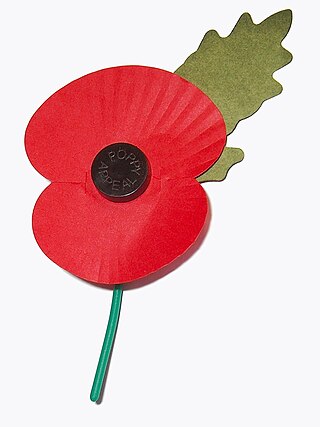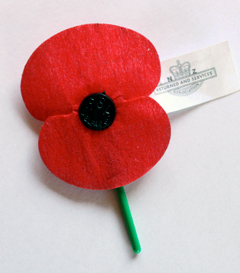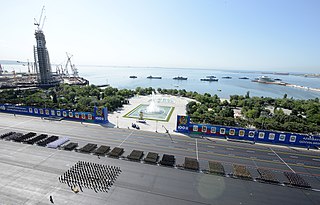
Anzac Day is a national day of remembrance in Australia and New Zealand that broadly commemorates all Australians and New Zealanders "who served and died in all wars, conflicts, and peacekeeping operations" and "the contribution and suffering of all those who have served". Observed on 25 April each year, Anzac Day was originally devised to honour the members of the Australian and New Zealand Army Corps (ANZAC) who served in the Gallipoli Campaign, their first engagement in the First World War (1914–1918).

Remembrance Day is a memorial day observed in Commonwealth member states since the end of the First World War to honour armed forces members who have died in the line of duty. Following a tradition inaugurated by King George V in 1919, the day is also marked by war remembrances in many non-Commonwealth countries. In most countries, Remembrance Day is observed on 11 November to recall the end of First World War hostilities. Hostilities formally ended "at the 11th hour of the 11th day of the 11th month" of 1918, in accordance with the armistice signed by representatives of Germany and the Entente between 5:12 and 5:20 that morning. The First World War officially ended with the signing of the Treaty of Versailles on 28 June 1919.

Armistice Day, later known as Remembrance Day in the Commonwealth and Veterans Day in the United States, is commemorated every year on 11 November to mark the armistice signed between the Allies of World War I and Germany at Compiègne, France, at 5:45 am for the cessation of hostilities on the Western Front of World War I, which took effect at eleven in the morning—the "eleventh hour of the eleventh day of the eleventh month" of 1918. But, according to Thomas R. Gowenlock, an intelligence officer with the U.S. First Division, shelling from both sides continued for the rest of the day, ending only at nightfall. The armistice initially expired after a period of 36 days and had to be extended several times. A formal peace agreement was reached only when the Treaty of Versailles was signed the following year.
Public holidays in Australia refer to the holidays recognised in law in Australia. Although they are declared on a state and territory basis, they comprise a mixture of nationally celebrated days and holidays exclusive to the individual jurisdictions.

Remembrance Sunday is held in the United Kingdom as a day to commemorate the contribution of British and Commonwealth military and civilian servicemen and women in the two World Wars and later conflicts. It is held on the second Sunday in November. Remembrance Sunday, within the Church of England, falls in the liturgical period of Allsaintstide.

The Royal New Zealand Returned and Services' Association, best known simply as the RSA, is one of the largest voluntary welfare organisations in New Zealand and one of the oldest ex-service organisations in the world.

Waitangi Day, the national day of New Zealand, marks the anniversary of the initial signing – on 6 February 1840 – of the Treaty of Waitangi, which is regarded as the founding document of the nation. The first Waitangi Day was not celebrated until 1934, and it was made a national public holiday in 1974.

Public holidays in New Zealand consist of a variety of cultural, national, and religious holidays that are legislated in New Zealand. Workers can get a maximum of 12 public holidays and a minimum of 20 annual leave days a year.

Many nations around the world observe some kind of Armed Forces Day to honor their military forces. This day is not to be confused with Veterans Day or Memorial Day.

The Anzac Memorial is a heritage-listed war memorial, museum and monument located in Hyde Park South near Liverpool Street in the CBD of Sydney, Australia. The Art Deco monument was designed by C. Bruce Dellit, with the exterior adorned with monumental figural reliefs and sculptures by Rayner Hoff, and built from 1932 to 1934 by Kell & Rigby. This state-owned property was added to the New South Wales State Heritage Register on 23 April 2010.
Alexander William Campbell was the final surviving Australian participant of the Gallipoli campaign during the First World War. Campbell joined the Australian Army at the age of 16 in 1915, and served as a stores carrier for two months during the fighting at Gallipoli. He was invalided home and discharged in 1916. He later worked in large number of roles, was twice married and had nine children. He is the great-grandfather of actress, singer and model Ruby Rose.

There have been two Waitangi Day Acts passed by the New Zealand Parliament: the Waitangi Day Act 1960 and the Waitangi Day Act 1976. Neither made 6 February a public holiday; this was done by the New Zealand Day Act 1973. The first Waitangi Day Act was a token gesture towards acknowledging the Treaty of Waitangi. The second changed the name of the day from New Zealand Day back to Waitangi Day.

The Anzac Day match is an annual Australian rules football match between Collingwood and Essendon, two clubs in the Australian Football League, held on Anzac Day at the Melbourne Cricket Ground (MCG).
Martyrs' Day is an annual day observed by nations to salute the martyrdom of soldiers who lost their lives defending the sovereignty of the nation. The actual date may vary from one country to another. Here is a list of countries and Martyrs' Days.

The Cenotaph is a war memorial constructed in 1923 and located between Statue Square and the City Hall in Central, Hong Kong, that commemorates the dead in the two world wars who served in Hong Kong in the Royal Navy, British Army and Royal Air Force. Built in stone, it is an almost exact replica of the Cenotaph on Whitehall in London, UK. It is listed as a monument under the Antiquities and Monuments Ordinance.

The Sydney Cenotaph is a heritage-listed monument located in Martin Place, in Sydney, New South Wales, Australia. It was designed by Bertram Mackennal and built from 1927 to 1929 by Dorman Long & Co. It is also known as Martin Place Memorial and The Cenotaph. It is one of the oldest World War I monuments in central Sydney. It was added to the New South Wales State Heritage Register on 11 November 2009.

In New Zealand, the Arms Act 1983 is the primary statute controlling the possession and use of firearms and air guns.

Lone Pine Cemetery is a Commonwealth War Graves Commission cemetery dating from World War I in the former Anzac sector of the Gallipoli Peninsula, Turkey and the location of the Lone Pine Memorial, one of five memorials on the peninsula which commemorate servicemen of the former British Empire killed in the campaign but who have no known grave.

Foreign relations exist between the Commonwealth of Australia and the Republic of Turkey. Diplomatic relations between the two countries were established in 1967. Australia has had an embassy in Ankara since 1968, a consulate-general in Istanbul and a consulate in Çanakkale. Turkey has had an embassy in Canberra since 1967 and two consulates-general in Melbourne and Sydney.

Anzac Day is a day of remembrance in Queensland, Australia. It is a public holiday held on 25 April each year. The date is significant as the Australian and New Zealand troops first landed at Gallipoli in World War I on 25 April 1915.
















